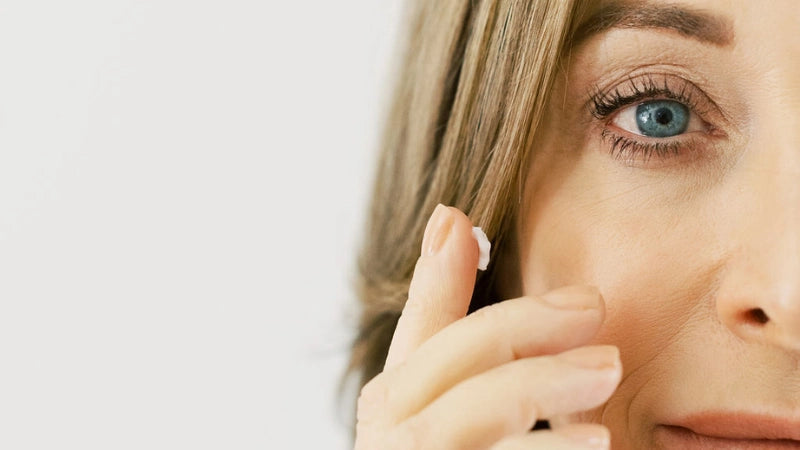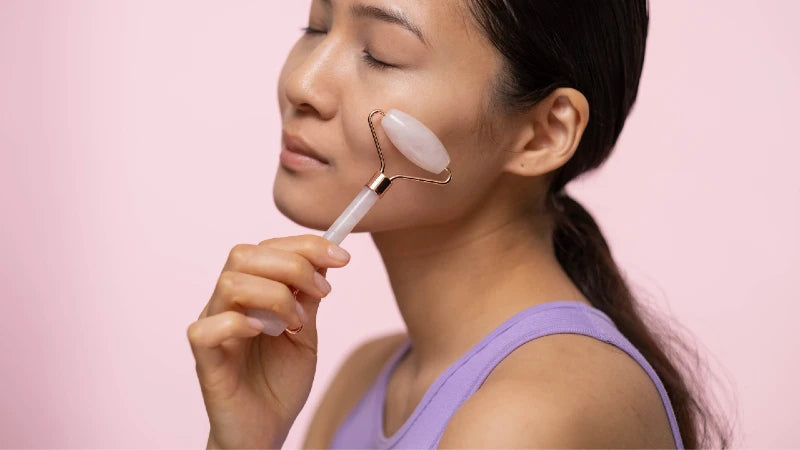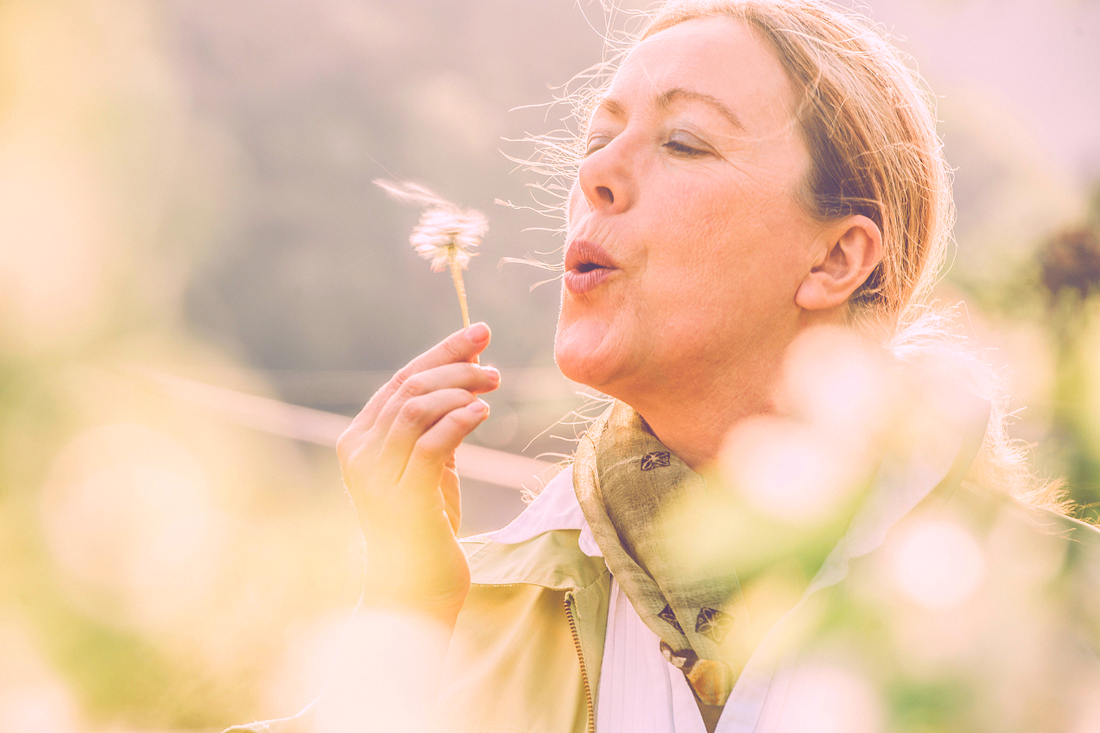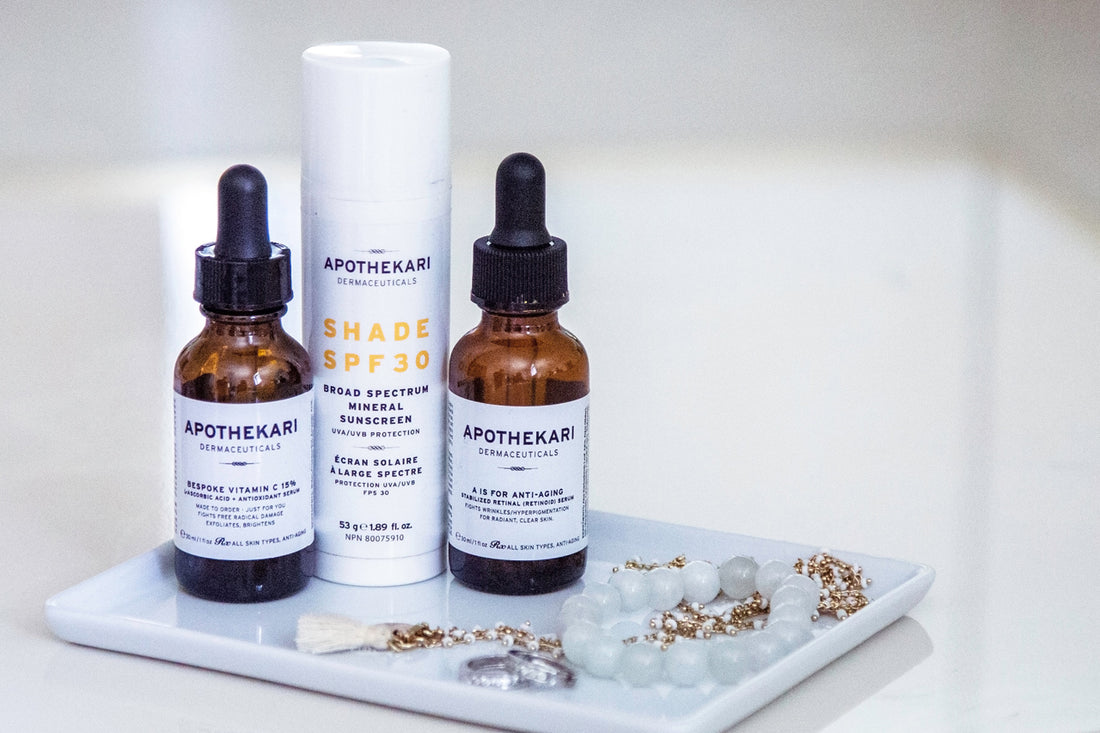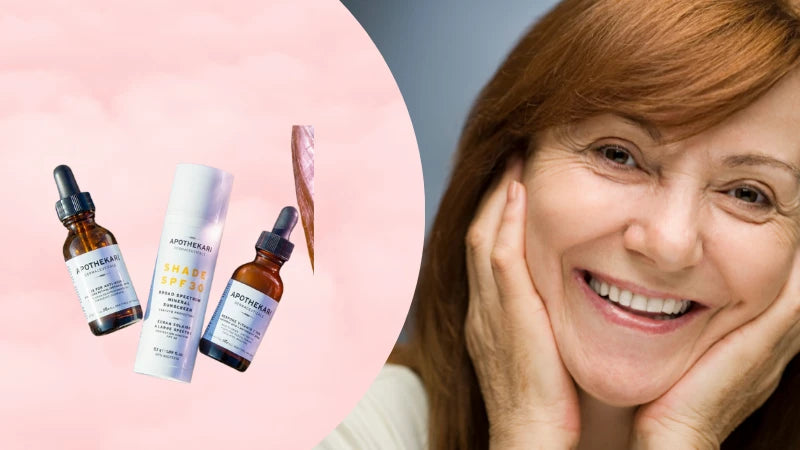Blog
How To Look After Your Aging Skin: A Pharmacist's Guide to Skincare After 50
If you’re seeking the inside scoop on aging skin care, step into the laboratory of skincare wisdom. Our founder, Sharmani, a pharmacist and a mature woman herself, expertly blends science with style to unveil the art of aging gracefully. Ready for a journey that’s as scientific as it is fabulous? Shop Active Treatment Serums Is 45 Too Late to Start A Skincare Routine? It’s never too late! Dive into the world of timeless beauty with three main products, the Holy Grail for mature skin: Sunscreen Vitamin C (like the triple combination of vitamin C and antioxidants found in our Glow Getter3 Serum) Retinoids, like the powerful, yet gentle retinaldehyde combined with other highly active ingredients in our Advanced+ Renewal Serum. These three products should form the foundation for your aging skin care regimen. What Should My Skincare Routine Be at 50? Whether you started earlier or are just embarking on your serious skincare journey at 50, there’s no wrong time to craft a precise skincare routine. The same principles apply to 50-something skin as it does in your 40s: sunscreen, vitamin C, and retinoids. And because 50-something skin can start to experience dryness, make sure you have a good moisturizer like our Daily Infusion+ on hand. This hydrating powerhouse keeps your skin’s balance in check. How Can I Make My Aging Skin Look Better? To minimize the appearance of wrinkles and fine lines and leave your skin looking radiant and glowing, elevate your skincare routine with our Radiant Skin Set, which combines a morning and nighttime serum (Glow Getter3 and Advanced+ Renewal) for radiant and youthful-looking mature skin. Make sure to use something to combat dryness, which can age skin. Should You Use Retinol in Your 50s? Absolutely, let science lead the way! Retinoids are backed by oodles of evidence to show that they stimulate collagen production, bidding farewell to fine lines and wrinkles. They also increase skin cell turnover, fight hyperpigmentation, and even increase your skin’s moisture content, helping to combat dryness. Think of retinoids as your skin’s secret weapon, deployed under the cover of night. (retinoids should be applied at night because they are sensitive to sunlight and prone to degradation when exposed to UV rays.) We’re huge fans of the benefits that come with retinaldehyde, found in our Advanced+ Renewal Serum. What is the Best Skin Care Routine for Women Over 50? For actual results (not overhyped nonsense), get started with our Ageless Skin Set. In addition to our two serums, Glow Getter3 and Advanced+ Renewal, we include our hydrating Daily Infusion+ Moisturizer and Amazing Clean, an exfoliating cleanser (but caution sensitive skin with this one!) It contains the essentials for better looking skin–just add sunscreen. What is a Good Skin Care Routine for Aging Skin? Crafting a good skincare routine for mature skin isn’t as difficult or as confusing as you may imagine. Start with cleansing, which helps remove dirt and make-up and provides a clean canvas to help absorb other products. Next, prevent damage and protect skin with antioxidants and sunscreen. Finally, add in a retinoid treatment to rejuvenate and perfect skin. Nourishing face oils like our Antioxidant Face Oil and performance moisturizers like our Daily Infusion+ Moisturizer help keep mature skin protected against dryness, which can emphasize the appearance of wrinkles and fine lines. What is the Best Treatment for Aging Skin? The ultimate treatment for mature skin? It’s about finding the right products that work for YOUR skin and using them consistently. Beautiful skin doesn’t happen overnight or by chance. It’s a combination of a number of factors, including your lifestyle, your genetics and the skincare products you use. Eat well, exercise, get enough sleep, manage stress. Then add in scientifically proven ingredients and use them consistently in your skincare routine. Find products and a program that works for you and stick with it. It can take weeks to months to notice a difference. But stay with it, and you’ll reap the benefits. Dos and Don’ts For Skincare After 50 Now, let’s dive into the two most important Dos and Don’ts for skincare after 50. ✅ Do embrace a consistent routine tailored to your skin’s needs. ❌ Don’t skip sunscreen; it’s your best defense against premature aging. Should You Use Anti-Aging Products? Let’s challenge the term “anti-aging.” At Apothekari, we believe in embracing the beauty of getting older. Anti-aging suggests a fight against the natural process of aging, while we encourage a celebration of the journey and caring for your skin gracefully. We’ve long dropped this term from our marketing and we think it’s high time that everyone else does too! How to Care for Oily Mature Skin If you’re dealing with oily aging skin, embrace balance. Cleanse with our Amazing Clean, designed for exfoliation without irritating. Use lightweight moisturizers like our Daily Infusion+ to hydrate without causing excess oil. Retinoids like the retinaldehyde found in our Advanced+ Renewal Serum have been shown to minimize the appearance of blemishes and breakouts due to their impact on managing oil production and antibacterial effects. If you find yourself starting to breakout like you did in your teens, Advanced+ Renewal may just save the day! How Can I Make My Aging Skin Look Better? We really don’t think there’s a better place to start seeing a transformation in your mature skin than by elevating your routine with our Radiant Skin Set. This duo of serums (Glow Getter3 and Advanced+ Renewal) works in harmony for radiant, youthful-looking skin. As you gracefully move through your 60s and 70s, continue with the same Apothekari products that are working for you. There’s no need to change things up because your skin doesn’t become immune to the effects of a good skin care product. If you notice that your skin becomes drier or more sensitive, look for moisturizers that deliver heavy-duty results. Or consider adding in a face oil. You may also notice dryness in areas besides your face. It’s one of the reasons that we developed More Than Lip Service. This vulvar and vaginal moisturizer delivers fast, long-lasting, and hormone-free relief from the pain, burning, and irritation that many women experience down there as they get older. Explore how our range adapts to the evolving needs of your skin, ensuring a radiant and healthy complexion. Here’s to timeless elegance, no matter your age.
Learn more11 Overrated Skincare Products (That You Probably Don't Need)
Just because a cute 20-something is pushing it on social media, it doesn’t mean you need it, or that it’s even good for your skin—here are 11 overrated skincare products that your skin (and your wallet) can do without. SHOP RADIANT SKIN SET Overrated Skincare Products. What Skincare Products Are Necessary? Hype isn’t something that we DON’T do at Apothekari – our line of no fluff, more active ‘stuff’ treatments will transform your skin and provide relief from your skin’s changing needs. Do We Really Need All These Skincare Products? Here are some on the ‘to ditch’ list. 1. At-Home Microneedling Kits Studies have shown microneedling to be beneficial in helping with the absorption of topical skincare treatments like vitamin C and retinoids—when done in a professional setting. At home kits have issues around hygiene and safety. AND, the needling device is likely to be very shallow—so shallow that it won’t be effective. 2. Activated Charcoal Treatments From cleansers, to soaps and shampoos (and underarm detoxes too), charcoal containing products are big sellers these days. While they claim to ‘detox’ and remove dirt and oil, they can only do this on the skin’s surface so the effect is unlikely to be significant. Overrated skincare product for sure – especially don’t buy into charcoal detoxes for your armpits. They are totally unnecessary when making the switch to a natural deodorant like ours. 3. Cellulite Cream They’re usually pricey. More importantly, they do not work. Cellulite creams work no better than a good moisturizer. And, research has shown that physical massage and exercise can help to improve the appearance of cellulite more than any cream can. Keep in mind that cellulite is part of the normal aging process and every woman gets it. It’s impossible to shift it with topical treatments. Does Some Skincare Make Your Skin Worse? Some skincare products and ingredients can actually be harmful to skin, especially if not used correctly. For example: 4. Essential Oils Some essential oils have some great properties—and they smell amazing (love them in my diffuser). But, applied full strength to the face, they can lead to dermatitis, skin irritation, rosacea or psoriasis. While it can be safe to use essential oils on the face, they must be diluted in a carrier oil first. What is unnecessary in skin care routine? Although lots of people use these products, there’s often no need. Here are more overrated skin care products that you can say bye-bye to. 5. Toners We’re not alone in our distaste for useless skincare products and toners fit the bill. Unless they are formulated with ingredients that have a specific function—to hydrate, or minimize acne—they don’t need to take up space on your counter. 6. Stretch Mark Treatments Much like cellulite creams, stretch mark products can’t penetrate deep enough to treat the scarring in the dermis layer of the skin. We’re ranking this up there for worst skincare products. Try a good moisturizer instead. 7. CBD Skin Care Is this not the hottest trend right now? While there’s some research to show that CBD helps with skin inflammation, much more is needed before we can determine whether it fits into the category of overrated skincare products, or ones that actually deliver as promised. These Skin Care Trends Need to Go Away Popular on TikTok and other social media channels, there are some trends that look like a lot of fun—and promise tons of unproven benefits. Now we’re not saying not to do these because for the most part, they’re harmless. But…don’t expect much benefit. Studies have shown that these just don’t work. 8. Face Rollers Is everyone using (or selling) a facial roller these days? They may feel soothing—especially when chilled—but there’s very little science to support the anti-aging claims associated with these overrated skincare products. Made of jade? Or rose quartz? Or amethyst? Doesn’t matter. While they’ll help to reduce swelling or puffiness for the short term, they’re not going to deliver any long term benefits. However, if you enjoy using them, there’s no harm. Just don’t expect the marketing miracles. 9. Face Yoga Face yoga, or even face exercises promises to help lift and firm your skin. Sounds tempting, right? Sadly, there’s very little evidence to suggest that it works. Here’s why. Our face is made up of skin, fat and muscle layered on top of the skull. Beneath the subcutaneous fat are fat pads, which are plump, fat-containing areas that fit together like a jigsaw puzzle to create the volume that gives our face shape. It’s these fat pads that play a role in the fullness of your face; the fuller your face, generally speaking, the younger you look. As we get older, the fat pads begin to thin and become less plump … and as they do this, they also sag. That sagging can leave the face looking hollow as we age. Facial exercises can’t increase the plumpness of the fat pads or make them sag less. They also don’t change the look or feel of the skin itself. No matter how many exercises you do, the muscles under the fat pads won’t help to make your face look fuller. And when it comes to wrinkles and fine lines, there’s no real impact on the support structures (collagen and elastin) in the skin that over time break down and lead to the signs of aging. The good news? Face exercises aren’t harmful, but they’re not a replacement for a consistent skin care routine, including cleansing, sun protection, retinoids, antioxidants and moisturizing. Procedures like fillers, Botox or surgery are far more effective than face exercises if you’re looking for more dramatic results. Check in with your dermatologist if it’s something you’re considering. Do them if they make you feel good, but just don’t expect your skin to look any different. 10. Bee Sting Facials Some studies have shown that bee stings can reduce inflammation. There is the sticky problem though, of bee sting allergies, which can be deadly in susceptible individuals. I think we can safely say that the risks outweigh the benefits for this DANGEROUS and overhyped skincare trend. 11. Snail Mucin A popular K-beauty ingredient, snail mucin comes from snails. It’s reported to have a high concentration of hyaluronic acid, which we know has many skin benefits. But, does it really need to be harvested from a snail when safe and effective options are already available, like the hyaluronic acid—and its relative, sodium hyaluronate—found in our Glow Getter Serum, Daily Infusion Moisturizer and More Than Lip Service Vulvar & Vaginal Moisturizer. What Skincare Products Are Really Necessary? I’ve called out 11 overrated skincare products that are likely going to suck up your time and not give you the results you’re looking for. If you can ignore those 11, which ones are essential to having healthy, glowing skin? Here’s a few things to consider: Know Your Skin Type The key to finding the right products is to identify your skin type – is it dry, oily, normal, combination? What are your concerns? Fine lines, wrinkles, dryness, acne, age spots? Understanding what your skin needs will help you to identify the ingredients and products that are the best fit. Be Consistent Like taking your medicines as instructed, a consistent skin care routine is key to getting results from your skincare products. You need to allow at least 4 to 6 weeks for topical treatments to notice a difference because it takes that long for your skin cells to turn over (renew). Along with regular use, don’t keep adding or eliminating products (unless you experience a reaction) because you’ll never get a grasp on what’s working for you. Be Gentle Too many stripping cleansers or exfoliating too often, can disrupt your skin’s protective barrier, leaving it prone to infection and irritation. Be mindful of the products you’re using. What Are the Only 3 Skincare Products You Need? If I had to choose just 3 skincare products, I know exactly which ones I’d choose: Sunscreen. And I’d use it Every SINGLE DAY. The sun’s UV rays are responsible for more than 80% of skin aging. Find a good broad spectrum sunscreen with a minimum SPF 30 and apply it in the morning. Retinoid. Retinoids like retinaldehyde in our Advanced+ Renewal Serum are one of the best ways to boost the production of collagen and elastin, which form part of our skin’s supporting network. These two proteins decline as we age, leading to fine lines, wrinkles and skin sag so it’s the most effective way to fight back against the most visible signs of aging. There are many other retinoids to choose from so find one that works for your skin to reap its benefits. Antioxidant. Antioxidants like the vitamin C in our Glow Getter Serum help to protect skin against free radicals—unstable molecules that we encounter as a result of sun and pollution exposure—that can lead to skin damage. Of course, life isn’t that simple so most of us need to rely on a few additional products as well. I’d say that a good cleanser—one that helps to remove dirt and make-up without stripping skin is also key. And finally, a moisturizer is something that most women need, especially as they get older and skin becomes drier. Need help choosing a moisturizer? Check out this post: 5 Questions to Ask Before You Choose a Moisturizer. Got anymore overrated skincare products to share? Let us know your worst skincare picks!
Learn moreHow To Look After Summer Skin | 7 of the Best Tips
We’re sharing 7 of the best tips to help you keep your summer skin looking radiant and beautiful this season and beyond. If you love the summertime as much I do, this is a must read! Shop All Apothekari How Can I Care For My Skin in the Summer? 1. First, Put on Your Sunscreen Remember when you were 10 and your mom sent you outside to play with your friends during summer break? ALL DAY LONG (you could only come in to pee and if you were lucky, maybe she’d give you a popsicle?). And sunscreen wasn’t a thing? Yeah, me too. I didn’t suffer too badly, because I don’t really burn, but I do remember some very pink faces in the neighborhood. More than the pain though—and we probably didn’t know it back then—that sunburn caused significant skin damage, increasing the chances of dark spots, roughness and dry, wrinkled skin. If you suffered a burn, it also increased your risk for skin cancers such as melanoma. This is why it’s so important to protect your skin against sun damage. The first step in protecting summer skin is to guard it from harm that can be caused by exposure to ultraviolet rays: Find and use a broad spectrum (minimum SPF 30) sunscreen that protects against both UVA and UVB rays. Don’t forget to apply to your ears, lips and tops of feet – most of us miss these areas. Seek out shady places whenever you’re out and about, especially during the sun’s peak hours between 10 am and 4 pm. Cover up with long sleeves and hats when you can. The sun can also burn your eyes, harming the retina, lens or cornea so make sure to protect your peepers with sunglasses and hats. 2. Antioxidants Rescue Summer Skin! While sunscreen is essential during hot weather, you may not know that you can amp up its protection. Meet sunscreen’s partner in crime, antioxidants. Sunscreens help to reduce the risk of skin cancer and premature skin aging, but you get even better protection if you combine sunscreen with an antioxidant. Even if you wear sunscreen every day, you’re not going to get 100% protection from the sun’s rays. An SPF 50+ sunscreen equals about 98% protection from UVB rays. Plus, most of us don’t apply nearly enough sunscreen (or as often enough) as we should to get the protection stated on the label. Just the smallest amount of residual UV exposure can trigger the development of free radicals, unstable molecules that can accelerate skin aging. Like unprotected sun exposure, free radicals can lead to wrinkles, dark spots, loss of firmness, and other issues. You may not be able to see or feel free radical damage, but it’s happening, just at a deeper level and the results will show up over time. Antioxidants help make up for what sunscreen can’t do – they protect against the free radical damage that exposure to sunlight causes. So even if you haven’t applied enough sunscreen—or forget to reapply—antioxidants neutralize the free-radical damage that’s caused by sun exposure. They also help defend skin from other sources of free radicals, such as pollution, smoke, high-energy visible (HEV) light and blue light from your cell phone. There isn’t a single BEST antioxidant but there are lots of amazing ones. Vitamins C and E are two of the most widely studied, but there are many others that also offer benefits, including ferulic acid, green tea, resveratrol and coenzyme Q10. When it comes to antioxidants, the more the merrier. A highly effective combination is available in our Bespoke Vitamin C Serum. Apply it every morning underneath your sunscreen. It not only protects, but will also help to deliver an irresistible glow. Ready for healthy, glowing skin in your 40s and beyond? Click here to download our FREE guide containing 5 tips to help you feel good and look your best as you ride the waves of your body’s changes. Treat the skin on all your body’s places with safe, effective products plus advice that will allow you to age with confidence, comfort and grace. 3. Correction 101 Sun damage can occur even with the consistent use of a sunscreen and an antioxidant. This is why you need to incorporate a retinoid into your routine. Derived from vitamin A, retinoids help to fight against skin damage associated with the sun. They’ve been shown to help boost the production of collagen and elastin for firmer, more supple skin; reduce the appearance of fine lines and wrinkles; brighten skin tone, reduce the appearance of dark spots and leave skin feeling smoother overall. Our A is for Anti-Aging Serum contains gentle yet highly effective retinaldehyde, making it suitable for almost all skin types. The formulation also reduces redness and increases skin’s moisture content. It’s no wonder we’ve dubbed A is for Anti-Aging, ‘a miracle for skin’—if one existed. 4. Summer Skin Needs Lighter Moisture Depending on where you live and your skin type, you may need to swap out your moisturizer. If it’s especially humid and your skin isn’t feeling dry, you may find that you don’t need a moisturizer—your morning serum and sunscreen may be all that you need. If you’ve been using face oils, you may want to give them a rest until cooler, drier weather arrives. Our Daily Infusion Moisturizer plumps, protects and refreshes skin without any hint of oiliness. It’s THE perfect year round moisturizer and ideal for summer skin. 5. Drink Up! Water of course! Drinking more water can’t fix dry skin but it does help it to function well by delivering nutrients to it. Make your daily hydration that much more special with ‘spa water’—cut up some fruit, add in some herbs and some ice. The flavors infuse the water, giving it a wonderful lift. 6. How Can I Get Glowing Skin in Summer? (Hint: Exfoliate!) Dead, dry skin cells that sit on the surface can leave your skin looking dull and lifeless. If you’re using our Bespoke Vitamin C Serum, you may be able to skip a facial exfoliant because the low pH L-ascorbic acid exfoliates. However, if you’re after additional exfoliation, add in a treatment that contains an alpha hydroxy acid like glycolic acid, lactic acid or malic acid. Use it once or twice a week at night, making sure to skip your retinoid treatment on those nights—the combination may be too much for most skin types. And, don’t forget your body—see tip 7 for how to take care of the rest of your skin. 7. Don’t Forget ALL Your Body’s Places We obsess over our faces but often neglect the skin on the rest of our body. Pay attention especially to these areas: Feet. Which can get rough from going barefeet or wearing sandals. Exfoliate with a scrub or pumice and slather on a moisturizing treatment like our Shea Body Butter or Lemon Rose Body Oil to lock in hydration. Neck. Shorter necklines leave our neck exposed to damage, much like our faces. Make it a habit to apply sunscreen and follow the same regimen as you do for your face. It’s important year round, but especially during the summer. Back of Hands. Much like your neck, your hands are prone to sun damage. Give them the same amount of care as your neck and face. Moisturize regularly, especially after showering or bathing or washing dishes. Taking care of the skin on your body is fantastic way to slip in some me time, ensuring that you aren’t neglecting your self care. Here’s to a safe and healthy, happy summer!
Learn more7 Reasons Why You've Got Dull Skin. Let's Get Your Glow Back
If you have dull skin, you need to know that all is not lost. Dull skin is fixable! In this post, we’re diving into why your skin is dull and sharing tips on how to get your radiant glow back. Vitamin C Matters! Vitamin C is one of the ingredients most well known to help revive dull skin into radiant, glowing skin. It is found in our skin’s outermost layers (epidermis and dermis) but it depletes as we get older. Sun damage and pollution can accelerate this decline, leading to skin that looks and feels dull, uneven and less firm. Replenish it with our Bespoke Vitamin C Serum, available in two concentrations 10% (for sensitive skin) and 15% (for normal/tolerant skin). Shop Bespoke Vitamin C 15% Shop Bespoke Vitamin C 10% Why Does My Skin Look Dull and Tired? 7 Reasons 1. You’re Drowning In Dead Skin Cells I know, ewww….You may not know it, but we shed millions of skin cells each day. Most of them just stay put at the top of our skin’s surface, acting like a fine layer of dust, leaving us with skin that looks dull and grey. The Fix? Exfoliate. Remove the dead, dry skin cells so that the new ones can shine through. Ingredients like alpha hydroxy acids and vitamin c (l-ascorbic acid) found in our Bespoke Vitamin C Serum, help to dissolve the dead skin cells, leaving you with brighter looking skin. Scrubs work too (manual exfoliation), but it’s easy to apply too much pressure so we recommend sticking with treatments (like serums) that ‘dissolve’ the skin cells instead. 2. Pollution Every time we step outside, we’re exposing our skin to polluted air, which contains dirt and gases like nitrogen dioxide, ozone, carbon monoxide and sulfur dioxide, which are harmful to skin. These can lead to the development of free radicals. Over time, free radicals damage skin, leading to wrinkles and fine lines plus pigmentation. This uneven skin tone and texture, diffuses light and leaving skin looking dull. The Fix? Wash your face every night to remove dirt and makeup, which can damage skin while you sleep. 3. You’re Stressed Out Stress is inevitable for most of us. It has an impact on our overall wellness and also on our skin. Prolonged stress not only makes you more tired over time, it also impacts the levels of the stress hormone cortisol, along with adrenaline. Increased levels of these hormones caus our heart rate to go up, our blood pressure to rise and sugar to accumulate in our bloodstream. Cortisol increases oil production, leading to acne or sensitive skin. Plus, its presence can increase the break down of skin components like collagen and elastin leading to wrinkles, lines and you got it, dull skin. The Fix? Getting stress under control will help, so try to do that as much as you can. When it comes to your skin, focus on gentle cleansing (our Cloud Nine Foaming Cleansing Crème is a great option) along with moisturizers and treatments rich in antioxidants, and other skin nourishing ingredients to help combat the impact of stress. 4. Blame Your Hormones Fluctuating hormone levels, like those we experience through puberty and menopause, can affect our skin’s appearance. Beyond acne and blemishes, menopause leads to a dip in estrogen levels, which can result in skin that’s drier, leaving it looking dull and lackluster. The Fix? Switch to more hydrating moisturizers and and apply them more often if needed. Consider adding in oils like our Antioxidant Face Oil. Also, lifestyle changes can help to help combat the dryness. More in this post. 5. Your Skin is Dehydrated Without enough hydration, dull skin often follows. Moisture helps to plump up skin cells, leaving them looking more radiant. This isn’t about drinking more water, because increased water consumption can’t make it’s way to dry skin. The Fix? Topical treatments that contain both humectants (like glycerin and hyaluronic acid), attract moisture into skin and emollients (like plant oils or fatty alcohols), soften skin, leaving skin looking less dry and dull. If your skin is particularly dry, add in occlusives (like lanolin, oils and butters) to trap in moisture. 6. Choose Your Drinks Carefully Alcohol and caffeine are dehydrating and can lead to skin that is dry and dull. The Fix? Enjoy them in moderation, swapping out for herbal teas, and non-alcoholic or low alcohol alternatives when you can. 7. Skipping out on Sunscreen UV rays are one of the biggest causes of skin damage. Over time, unprotected exposure to the sun’s rays can damage your skin’s protective barrier, leaving skin looking tired, dark and dull. The Fix? This one’s pretty straightforward – wear your sunscreen every day! What Products Are Good for Dull Skin? If the solutions above weren’t enough, consider the following: 1. Add a Serum to Your Routine Serums are often formulated with high concentrations of active ingredients to help brighten, boost hydration and diminish the signs of aging. Vitamin C serums brighten skin tone, while retinoids help to boost collagen production, pushing away old skin cells and allowing fresh, new ones to come to the surface. There are many forms of vitamin C to choose from – all are great antioxidants but have different effects. L-ascorbic acid has the most skin-related research of any form of vitamin C. Other beneficial forms supported by research include tetrahexyldecyl ascorbate, sodium ascorbyl phosphate, ascorbyl palmitate, magnesium ascorbyl phosphate, ascorbyl palmitate and ascorbyl glucoside. 2. Ditch the Aggressive Cleansers Avoid harsh scrubs and drying soaps, which can irritate skin leaving it looking red, tight and flaky. 3. Stick With Lukewarm Water Hot water can strip away natural oils, disrupting the skin’s protective barrier and leaving it open to dryness (hello dullness) and irritation. 4. Consider a Procedure Topical treatments and lifestyle changes can go a long way but sometimes you may need a bit more help from your dermatologist. Check in with one if you need more help.
Learn moreThis Is How to Avoid Sun Damaged Skin Every Summer
Want to avoid sun damaged skin this, and every, summer? Learn how in this post! SHOP RADIANT SKIN SET Also known as premature aging or photoaging, sun damage refers to skin that’s been wrecked by exposure to the sun’s harmful ultraviolet (UV rays). There are ways to prevent, and to repair, some of this damage. Read on for more information. Every time you go outside or sit by a window without sun protection, or use a tanning bed, you’re putting yourself at risk for skin damage. Over time, this damage can build up, leading to skin changes making you look years older than you normally would. Changes include: Wrinkles and fine lines Age spots and other pigmentation Loose skin Spider veins Blotchy or ruddy complexion Tanning beds can cause these changes to occur very quickly, sometimes in as little as a year! The damage can lead to deeper lines or dry, scaly patches – actinic keratoses (AKs), pre-cancerous skin growth, which can lead to skin cancer. You Can Protect Against Sun Damaged Skin. Reverse It Also Radiant Skin Set The best way to decrease your chances of sun damaged skin is to protect yourself from the sun’s UV rays. Don’t sit out with unprotected skin – wear long sleeves and put on sunglasses Seek shade wherever possible Minimize sun exposure when UV rays are strongest, between 10 am and 4 pm. Use a well-formulated sunscreen with a minimum SPF 30 whenever possible. Curious about how to use sunscreen properly? Read more here. Adding in an antioxidant formulation like our Glow Getter 3, helps protect skin further. Antioxidants like vitamin C and E and green tea, are antioxidants that help protect skin from the free radical damage that comes with sun exposure. Free radicals are unstable molecules that attack skin’s proteins (collagen and elastin, for example), lipids and worst of all, DNA. Antioxidants help protect against this kind of damage. We like to apply Bespoke Vitamin C every morning underneath our sunscreen. Already have skin that’s damaged? Retinoids, a class of ingredients that come from Vitamin A, have been shown to help reverse some of the damage. Retinoids boost collagen production in skin, helping to maintain its firmness. Our Advanced+ Renewal contains retinaldehyde, a gentle and highly effective retinoid, along with other actives, which helps to reduce the appearance of wrinkles and fine lines, brighten skin, reduce hyperpigmentation and protect it against sun damage. Find both serums in our Radiant Skin Set. Is It Time to Visit Your Dermatologist? If your skin is seriously sun damaged, and you’ve tried topical treatments without much success, you may want to check in with your dermatologist. A dermatologist can help to determine if a prescription treatment may be more suitable. Or, if you’re a candidate for a medical procedure: Laser Resurfacing. Intense beams of light can remove layers of sun damaged skin and trigger the formation of collagen, leaving skin looking healthier Chemical Peels. Strips away sun-damaged skin Photorejuvenation (also known as intense pulsed light – IPL). Bursts of pulsed light are used to reach the deeper layers of skin and smooth out sunspots and freckles Microdermabrasion. Buffs off the top layer of skin with sand-like particles, which stimulates the growth of new skin underneath. Bleaching Creams. Bleaching chemicals smooth out uneven skin coloring. Sun Damaged Skin – Prevention is Always Best! Wear sunscreen every day. Minimize sun exposure. Add in an antioxidant and a retinoid into your skincare routine. There’s really no reason for sun damaged skin. We can keep our skin looking good for decades if we just take care of it.
Learn moreHow To Get More Radiant Skin
Glowy, radiant skin is a sign of healthy skin – a look that that we all aspire to. Consistently using the right combination of products is key to radiant skin. Learn more in this post. SHOP RADIANT SKIN SET What Robs You of Radiant Skin? Lack of sleep, stress, aging and even what you eat can rob your complexion of its radiance. Skin that looks dull and tired can become luminous and glowing by using the right products along with some expert tips. Here’s how to achieve radiant skin. 4 Tips for Radiant Skin Cleanse. Start with a clean ‘canvas’ by removing dirt including oil, pollution and make-up that can leave skin looking dull. Choose between two foaming cleansers to suit most skin types: AHA-Mazing Clean Cleansing Gel – Exfoliate, cleanse and hydrate with this foaming cleansing that soothes skin and senses. Triple combination of alpha hydroxy acids (AHAs) and a refreshing mint scent. Cloud Nine Foaming Cleansing Crème – Clean, moisturize and protect skin with this gentle, foaming cleanser. Rich with antioxidant and anti-inflammatory ingredients and ideal for aging and sensitive skin. Exfoliate. Nothing strips away your glow more than having a layer of dry, dead skin cells sitting on your skin’s surface. Exfoliation helps to remove these cells and brightens skin almost immediately. You can exfoliate physically with a scrub or chemically with an acid. When it comes to facial exfoliation, we lean towards chemical exfoliation, which only penetrates through the skin’s uppermost layer. Scrubs and polishes are more prone to aggressive use, which can lead to skin irritation. In addition to our AHA-Mazing Clean Cleansing Gel, which exfoliates and cleanses, our Bespoke Vitamin C Serum, provides light exfoliation. Brighten. As we age, skin can become unevenly toned due to age spots, melasma, etc. The following ingredients can brighten skin: Niacinamide. Lightens skin discolouration and fades age spots by decreasing the number of melanin transferred to pigment-producing cells (melanocytes) to skin cells by more than half. Find niacinamide in A is for Anti-Aging, where it is combined with Phenylethyl Resorcinol, another skin brightening agent and retinaldehyde, for the ultimate in age prevention properties. Vitamin C. Found in our Bespoke Vitamin C Serum, it brightens skin by disrupting the production of melanin, a skin pigment that causes discolouration and age spots. Because the two ingredients above do so much to improve skin’s glow, we’ve combined A is for Anti-Aging and our Bespoke Vitamin C Serum into the Radiant Skin Set. When used together regularly, these serums will help to illuminate your complexion. Expect to see results within a few weeks and optimal results in about three months. Other ingredients that can help to brighten skin include lactic acid, arbutin, kojic acid and licorice. Hydrate. Dry and dehydrated skin looks dull and may even appear more wrinkled. Although you may not need a dedicated moisturizer, it’s important to incorporate products that can help to replenish and lock in moisture. In a previous post we discussed how to choose a moisturizer and our Daily Infusion Moisturizer provides a perfect balance of the 3 types of ingredients needed to keep skin hydrated. Fake It Till You Make It! While you’re waiting for results from topical treatment to kick in, you can rely on make-up, which helps to deliver an instant glow. Look for products that contain minerals like mica, which reflect light to deliver radiant skin allover.
Learn more3 Essential Skin Care Products for Summer
3 essential skin care products, found in our Anti-Aging Set, are important to protect and perfect skin this summer and year-round. (*Shade SPF 30 and our Anti-Aging Set have been discontinued. Our Radiant Skin Set includes the same 2 serums that were included in our Anti-Aging Set.) SHOP RADIANT SKIN SET Protect Skin & Prevent Damage Hands up if you love the sun! Sunshine and the sun’s heat make us feel good. The sun’s rays may be great for our mental health, but they’re not so kind to our skin. In fact, it’s estimated that unprotected exposure to the sun’s ultraviolet rays are responsible for more than 80% of skin damage. Regular sunscreen use along with topical antioxidants help to protect skin and prevent damage caused by the sun and our environment. Sunscreens, like Shade SPF 30 help to block the UVA and UVB rays that are responsible for sunburn and skin aging. Shade SPF 30 is a naturally safe, mineral-based zinc oxide sunscreen that offers broad spectrum, non-whitening sun protection and should be used every day, year round. Antioxidants work to protect skin from the free radicals that are generated by exposure to UV rays, pollution, smoke and other environmental factors. Free radicals are unstable molecules which harm skin and accelerate aging by destroying substances including collagen and elastin, proteins which are important to maintain youthful looking skin. Our Bespoke Vitamin C Serum is made to order and contains L-ascorbic acid plus additional antioxidants to not only protect skin, but also boost collagen production, brighten skin and moisturize. Essential Skin Care Products To Perfect Skin While preventing skin damage is the first step in keeping skin healthy, it’s also important to support skin with treatments that help to repair and perfect it. This is where retinoids come in. Retinoids, like retinaldehyde, found in our A is for Anti-Aging Serum, work by ‘turning on’ genes and cells that are involved in collagen production. Used regularly, this essential skin care product can help to reverse sun damage and promote healthier skin including: Reduce the appearance of wrinkles and fine lines Brighten skin Increase skin moisture content and soothe skin irritation Assist in management of acne and blemishes (retinaldehyde has antibacterial activity) A bonus of A is for Anti-Aging is that retinaldehyde is an effective and gentle retinoid, making it suitable for most skin types. 3 Essential Skin Care Products in One Set Because these 3 products – a sunscreen, an antioxidant treatment and a retinoid – are fundamental to great skin, we’ve combined them into our Anti-Aging Set, which currently features a $40 gift certificate. Summertime Skin Care is Year Round Skin Care While we tend to focus on sun protection in the summer, it’s important all year. The sun emits more UVB rays during the summer (UVB rays are responsible for burning) but emits the same amount of UVA rays regardless of season. UVA rays penetrate deeper than UVB rays and are the ones responsible for skin aging including the risk of developing some types of skin cancer. Consider sunscreen the number one essential skin care product and use it every single day!
Learn moreBoost Collagen With This Face Serum
Boost collagen with Apothekari A is for Anti-Aging, a face serum that can help keep skin looking healthy and youthful. Shop A Is for Anti-Aging Serum (Our Retinoid Formulation) What is Collagen? Collagen is the protein most abundant in mammals and it’s behind pretty much everything holding you up right now – your bones, skin and muscle. Collagen is made up of amino acids, the building blocks of protein, which give strength and structure to tissues. This allows us to remain bendy, bouncy and generally supple. It’s one of the main components of skin but we sadly start to lose collagen as early as our twenties. Over time, this can lead to fine lines, wrinkles, sagging and loose skin. Fortunately, we can help to boost collagen levels with a combination of factors including lifestyle changes, sound nutrition plus topical treatments including this face serum, A is for Anti-Aging. Sunscreen and antioxidants are a great first defense against damage to collagen. Exposure to UV rays turns up the production of MMPs (matrix metalloproteinases), a group of enzymes responsible for the degradation of most of the body’s proteins like collagen. A well formulated sunscreen, like Shade SPF 30, along with an antioxidant treatment can help to neutralize free radicals and quash inflammation. The good news about some antioxidants, like Vitamin C and green tea, found in our Bespoke Vitamin C Serum, is that in addition to protecting against free radicals, they also protect against collagen loss and help to boost its production. Learn more about how to beat sun damage here. This Face Serum Can Help To Boost Collagen While collagen creams are available, the collagen molecule itself is too large to penetrate skin to where it’s needed, deep in the dermis layer. The better way to boost collagen is to apply treatments that contain ingredients which have been shown to stimulate the production of collagen. In addition to antioxidants, peptides plus retinoids have been shown to boost collagen production. Retinoids like prescription retinoic acid or over the counter retinaldehyde, found in our A is for Anti-Aging Serum, have been around for a while and have a lot of evidence to support their ability to boost collagen levels. They work by ‘turning on’ genes and cells that are involved in collagen production and also help to organize new and existing collagen. Over time, they can minimize the appearance of fine lines and wrinkles. The biggest downside of retinoids is their ability to cause skin irritation. That’s why we are such big fans of the retinaldehyde found in A is for Anti-Aging, which is not only effective, but also the least irritating of all retinoids. Retinaldehyde is supported by other ingredients that can help to protect and improve skin’s appearance. Lifestyle Factors Beyond protecting collagen in your body with topical treatments, there are other things you can do as well. Smoking, stress, excessive alcohol consumption and a diet high in sugar and processed food can all accelerate the loss of collagen. Consume foods high in lean protein, essential fatty acids, fruits and vegetables, which contain amino acids, anti-inflammatory and antioxidant ingredients and help create a foundation for firm skin. Don’t skimp on protein, which is needed to produce collagen. If you’re curious about whether collagen supplements can help to boost collagen levels, know that while the research looks promising, it isn’t yet conclusive. For best results, look for brands that contain hydrolyzed peptides as these are the best way for the collagen stimulating molecules to reach your bloodstream. Other nutrients such as lysine, MSM (methylsulfonylmethane) and keratin stimulate collagen and vitamin C is essential for its production as well.
Learn moreBeat Sun Damage This Summer
Sun damage, caused by unprotected exposure to the sun’s ultraviolet (UV) rays, is one of the main factors involved in aging skin with research showing that it is responsible for more than 80% of the damage. In this post, learn how a combination of the right products (found in our Anti-Aging Set, and which currently features a $40 gift certificate to apply to a future purchase), plus safe sun habits can help you to beat sun damage and minimize its effects, when it occurs. Our Anti-Aging Set has been discontinued, but consider our Ageless Skin Set. Shop Apothekari Ageless Skin Set The Sun is Your Skin’s Worst Enemy One can’t deny how good sunshine feels on our skin. Yet, UV rays are the primary cause of premature skin aging and skin cancer. Protecting your skin against sun damage is the most important thing you can do to help keep your skin looking healthy and beautiful, yet most people don’t take this seriously. The sun produces two main types of UV rays that cause sun damage: UVA and UVB. UVA rays are longer penetrating rays, which reach deep into the skin. They can trigger skin cancer and also break down the skin’s supporting network, including the destruction of elastin and collagen, which ultimately leads to fine lines, wrinkles and saggy skin. UVA rays also disrupt melanin, leading to skin discolourations, AKA age spots. UVB rays are shorter rays and they are primarily associated with sunburns. However, they are also responsible for premature aging and skin cancer. Long term exposure to UV rays impacts the skin’s ability to produce components such as antioxidants, essential fatty acids, ceramides, hyaluronic acid, etc., that are essential to its wellbeing. In addition to skin cancer, other undesirable changes may occur: Increased fine lines and wrinkles Uneven skin tone and discoloration Dry, thin and crepey looking skin A build-up of dead, dry skin cells, leaving skin looking dull and lifeless Sunscreens & Antioxidants Protect Against Sun Damage To fight against UV damage, protect your skin with a broad spectrum UVA/UVB sunscreen. Choose a product with a minimum of SPF 30 and use it every day, year round. Apothekari Shade SPF 30 is a zinc oxide, mineral-based sunscreen that is non-whitening and contains additional antioxidant protection. It’s never too late to start using sunscreen and the sooner, the better. Remember to reapply sunscreen if you are going to be outside for a long time or sweating. Don’t forget your lips, ears and the tops of your feet. Antioxidants complement the benefits of sunscreen by helping to defend against the free radical damage that accompanies UV rays. We recommend that you layer on an antioxidant treatment every morning under your sunscreen to take advantage of the one-two punch that you’ll get from this combination. Our Bespoke Vitamin C Serum contains l-ascorbic acid plus an arsenal of antioxidants including vitamin e, green tea extract, ferulic acid and pomegranate seed oil to help protect skin. Each bottle is made to order to guarantee freshness. Correct the Effects of Sun Damage Anti-Aging Set While sunscreen and sun protection are the best way to protect and prevent sun damage, products are available that can help to diminish its impact when it occurs: Retinoids, like retinaldehyde, found in our A is for Anti-Aging Serum, visibly diminish the appearance of wrinkles and other signs of aging by boosting collagen production and increasing skin cell turnover Vitamin C. In addition to its antioxidant benefits, vitamin C can brighten skin and help to make it appear more evenly toned. Find it in our Bespoke Vitamin C Serum Treatments such as alpha hydroxy acids (AHAs) or beta hydroxy acid (BHA) help to remove the buildup of dry, dead skin that cause dullness, resulting in more radiant skin. Our Anti-Aging Set contains A is for Anti-Aging (retinoid serum), Bespoke Vitamin C Serum (Vitamin C + antioxidants) and Shade SPF 30 (suncreen). This combination of 3 products is one of the most effective ways to help defeat sun damage. Lifestyle Tips While topical products can help to protect and perfect skin, these tips will go a long way to helping protect skin against sun damage: Cover up with a hat, sunglasses and long sleeves. Seek shade where possible Stay out of the sun during peak hours between 10 am and 4 pm Who’s ready for summer?
Learn moreHow To Reduce Wrinkles
If you’re curious about how to reduce wrinkles, this post explains that. Wrinkles are one of the most common symptoms of aging skin, but using the right products – a sunscreen like Shade SPF 30 and a retinoid like A is for Anti-Aging Serum, can help to reduce them. Shop A Is for Anti-Aging Serum (Our Retinoid Formulation) What is a Wrinkle? Wrinkles are creases, folds, or ridges in the skin, which tend to appear as we get older. They are most frequently found on parts of the body that are exposed to sunlight, including the face, the neck and chest, the back of the hands and the arms. Sun damage, smoking, some medications and dehydration along with environmental and genetic factors can influence their development. Facial expressions, such as repeatedly smiling, frowning, or squinting may also lead to fine lines and wrinkles. And, the thinner, drier and less elastic skin that accompanies aging, impact their formation as well. Younger skin has more elasticity, allowing it to spring back. The aging process makes springing back harder and less frequent, resulting in permanent lines aka, wrinkles. Wrinkles – Lifestyle and Environmental Factors Unprotected exposure to UV light is thought to be one of the biggest contributors to wrinkle development. UV rays break down collagen and elastin fibers, which form part of the skin’s supporting network. This damage results in skin that is weaker and less flexible, causing it to droop and wrinkles to develop. This is why sun protection is one of the best things you can do to reduce wrinkles. Wear a broad spectrum, UVA/UVB blocking sunscreen with a minimum SPF of 30 every day, year round. Shade SPF 30 is a naturally safe, mineral-based (zinc oxide) and non-whitening formulation to consider Cover up with clothing, seek shade, wear hats and sunglasses to protect skin against sun damage Smoking speeds up the aging process by reducing blood supply to the skin. Excess consumption of alcohol can result in dehydration, which causes skin to become dry and appear more wrinkled. And finally, sleeping on your side or face contributes to face lines while repetitive facial expressions (like squinting) overworks facial muscles and can result in grooves beneath the skin’s surface, which eventually leads to wrinkles. Treatments That Reduce Wrinkles When it comes to topical ingredients, there are a few that can help, but retinoids, which are derived from vitamin A, are supported by the most amount of research to support their efficacy in the reduction of fine wrinkles. They have also been shown to reduce pigmentation and decrease skin roughness. Retinoids include ingredients such as retinoic acid, retinaldehyde, retinol and retinyl palmitate. They work by increasing the production of collagen and by stimulating the production of new blood vessels in the skin, which improves skin color. It takes about three to six months of regular use before improvements in wrinkles are apparent and the best results take six to 12 months. The one downside of retinoids is that they can cause skin dryness and irritation so it may be useful to gradually work up to nightly applications, especially if you have sensitive skin. Retinaldehyde, which is found in A is for Anti-Aging is effective and one of the gentlest forms of retinoid available, making it suitable for most skin types. Retinaldehyde has the added benefit of being antibacterial, which delivers benefit to acne sufferers as well. A is for Anti-Aging also contains niacinamide, which can stimulate collagen production. The combination helps to minimize fine lines and wrinkles. Keep in mind that retinoids are broken down in sunlight so apply this serum at night in order to maximize benefits. A two-pronged approach will serve you best when it comes to wrinkle reduction: sunscreen every day in the morning and a retinoid each night.
Learn moreAll Skin Needs These 3 Anti-Aging Products
All skin benefits from 3 anti-aging products in order to keep it looking its very best – a sunscreen, an antioxidant treatment and a retinoid. In this post, we’re diving into why these products are so important if you’re interested in maintaining healthy and beautiful skin. (This set has been discontinued. Consider our Ageless skin set instead) Shop Apothekari Ageless Skin Set Here’s How Your Skin Ages Skin ages in two main ways – extrinsically and intrinsically – discussed in detail in an earlier post. Extrinsic aging occurs as result of things happening outside our bodies – UV rays, pollution, smoking & smoke exposure as well as diet and lifestyle. These factors are the biggest contributors to skin aging and can lead to thick and coarse skin, age spots and wrinkles. They can also influence the development of many types of skin cancer. Over time, ultraviolet light can damage elastin, collagen and glycosoaminoglycans (GAGs), proteins and sugars naturally found in skin and which help to keep it firm, supple, hydrated and line free. Intrinsic aging occurs naturally over a period of years and is related mainly to our genetic make-up along with hormonal and metabolic processes. If you’re interested to know more, we’ve written a detailed post on what happens to skin at menopause . Don’t be disheartened, though. If you’ve been dealt a bad hand when it comes to your genes, a healthy lifestyle, along with the right kinds of skincare products, can help to counteract many of the effects of your genes. All Skin Needs These 3 Anti-Aging Products Preventing skin damage is one of the best things you can do for your skin in the long term. Exposure to the sun’s rays is thought to be responsible for more than 80% of skin aging and ultimately leads to skin that is saggy, less resilient, wrinkled and possibly discolored. Anything you can do to protect skin from this damage is your best insurance against the effects of aging. Additionally, products that perfect skin to correct damage or imperfections are just as important. These 3 anti-aging products are the ones backed by clinical research and years of experience as offering the most benefit to skin: Sunscreen. A sunscreen that protects against both UVA (AGING) and UVB (BURNING) rays is essential to any skincare routine. Apothekari Shade SPF 30 delivers just that in a non-whitening, mineral based (zinc oxide), non-greasy formulation. Antioxidant. Antioxidants help to protect skin from damage caused by free radicals when we’re exposed to sunlight and pollution, for example. They should be applied to skin every morning along with sunscreen because they help boost the effectiveness of one another. You can find the most widely researched antioxidant, Vitamin C (as L-ascorbic acid) plus a range of other skin beneficial antioxidants such as ferulic acid, green tea, astaxanthin, alpha lipoic acid and pomegranate seed oil in our Bespoke Vitamin C Serum, made fresh for each order. Retinoid. We LOVE retinoids at Apothekari! Retinoids are a class of ingredients that are derived from Vitamin A and which include prescription retinoic acid and tazarotene plus over the counter options such as retinol and retinaldehyde. In addition to helping boost collagen and elastic production, they increase skin cell turnover (getting new, healthy skin cells to come to the surface), reverse sun damage and minimize the appearance of wrinkles and fine lines. We are big fans of retinaldehyde, which delivers results while being one of the gentlest retinoids, making it suitable for most skin types. Retinaldehyde also has antibacterial effects, making it a useful addition to the management of acne. Find retinaldehyde in A is for Anti-Aging, where it is combined with other skin beneficial ingredients. Are you ready to up your skincare game with these 3 anti-aging skincare products?
Learn more3 Holy Grail Skin Care Products
In this blog post, I’m going to share with you the most important products in my skin care routine, or what I like to refer to as my Holy Grail Skin Care products. Like you, I’m a pretty busy kind of woman so when it comes to managing my life, I’m always on the lookout for ways to simplify things. If there’s a faster, easier or better way to do something, I want to know about it. Radiant Skin Set SHOP RADIANT SKIN SET These Are the 3 Holy Grail Skin Care Products There are lots of good skincare products to choose from, but 3 make the biggest impact on your skin. My hope in sharing these 3 products is that it will help you to prioritize the items in your skin care regimen. If you are inspired to purchase and use fewer products, you’ll benefit from saving time both morning and at night, dealing with less clutter and making a smaller dent in your wallet. You don’t need dozens of skin care products; you just need a few of the right ones. The ones I discuss below are the ones that I consider as my holy grail skin care products. These are products that contain ingredients, which are backed by science to deliver results. The best part is that in my case, there are only 3! Let’s get to it then, shall we? Holy Grail Skin Care #1 Sunscreen You may be sick of hearing me stress the importance of daily sunscreen use. However, protecting your skin from sun exposure is hands down, the MOST important thing you can do to help keep your skin looking young and healthy. Exposure to ultraviolet rays is contributes to more than 80% of skin aging. If I say it all the time, it’s because it really is that important! While most of us are quite familiar with the effects of UVB rays – sunburn, anyone – we appreciate the importance of wearing sunscreen during the warmer, summer months or while visiting faraway tropical locations. UVA rays however, the ones that penetrate deep into the dermis, may not seem to carry as many negative effects but they are responsible for premature skin aging, contributing to both wrinkles and skin aging. They are prevalent year round and can pass through glass, clouds and windows. Both types of rays contribute to skin cancers so it’s not just our vanity at stake here, we’re also talking about our health. Whether you opt for a chemical or physical blocking sunscreen, ensure that it: Protects against both UVA and UVB rays Is photostable (won’t degrade upon exposure to sunlight) and Is a formulation that you enjoy using it. I’m partial to Shade SPF 30, our new mineral based zinc oxide sunscreen, which provides broad spectrum UV protection in a non-whitening base. It’s one of my go-tos every morning. Holy Grail Skin Care #2 A Retinoid It’s not just me, but ask any skin care professional about the importance of retinoids and you will get resounding agreement. Retinoids are absolutely essential to anyone serious about their skin. Derived from vitamin A, retinoids are a class of ingredients that deliver multiple skin benefits – unclogging pores, boosting collagen production to reduce wrinkles and fine lines, speeding up skin cell turnover to even out skin tone & discolouration and smoothing skin as well. Many individuals will start to notice a difference in as little as 4 to 6 weeks. Retinoids have been around since the 1970s when prescription only retinoic acid was approved for the treatment of acne. Soon after, dermatologists and patients began to notice that not only breakouts were diminishing, but that many users experienced a reduction in fine lines and hyperpigmentation as well. Whether you opt for over-the-counter retinol, retinaldehyde or retinyl palmitate or gravitate towards prescription options including retinoic acid or tazarotene, retinoids should be included in your skin care arsenal. Have you tried our A is for Anti-Aging Serum? Formulated with gentle retinaldehyde plus a combination of additional skin actives, it helps to protect against photo-aging, exfoliates, delivers anti-inflammatory/anti-irritant properties and brightens skin as well. Retinaldehyde also demonstrates anti-bacterial properties making it a useful addition in the management of acne as well. Keep the following in mind when using a retinoid: Retinoids are light sensitive so they are best applied at night Retinoids may make your skin worse before it gets better as their use is associated with dryness, redness and flaking. Minimize these side effects by starting slowly, applying one to two nights a week and gradually building up to daily use. If introduced in this way, most individuals can tolerate them well. Don’t use a retinoid if you are pregnant or breastfeeding. Holy Grail Skin Care #3 An Antioxidant Formulation. Which Vitamin C Serum is Best? We’ve written about the importance of using antioxidants previously. Antioxidants are ingredients that help to protect skin from damage caused by free radicals, unstable molecules that cause havoc in the skin, setting off a cascade of skin damage. Free radicals may be generated by pollution, ultraviolet radiation and smoke and we are exposed to them daily. Skin benefits from a mix of antioxidants including Vitamin C (especially L-ascorbic acid, which is backed by the most research), Vitamin E, green tea, ferulic acid, alpha lipoic acid, reservatrol, coenzyme q10, etc. Apply antioxidants in the morning prior to UV exposure in conjunction with your sunscreen to help minimize the impact of free radical damage caused by UV rays. Sunscreens and antioxidants play very well together. Antioxidants may be applied at night as well. While they fight free radicals during the day, at night, they play more of a reparative and rejuvenating role, also helping to replenish the concentration of antioxidants in the skin. Our Bespoke Vitamin C Serum is formulated with L-ascorbic acid plus a range of additional antioxidants including ferulic acid, Vitamin E, green tea extract along with glycerin and sodium hyaluronate to help protect, repair and moisturize skin. Shop Bespoke Vitamin C 15% Let’s hear it for skin care products that really make a difference to skin. What are your holy grail skin care products?
Learn more

